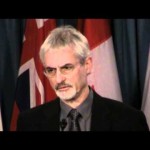
Plaintiffs seek to overturn election results in seven ridings.
from the Council of Canadians
Ottawa, March 26, 2012 — The Council of Canadians announced today that it is supporting applications under theCanada Elections Act by individual Canadians seeking to overturn federal election results in seven ridings. The ridings are Don Valley East, Elmwood-Transcona, Nipissing-Tamiskaming, Saskatoon-Rosetown-Biggar, Vancouver Island North, Winnipeg South Centre and Yukon. The legal actions to annul results are based on evidence of irregularities, fraud and other activities which affected the outcome of the elections.
"It's a sad day for Canadian democracy that we have to take this action," said Garry Neil, Executive Director of the Council of Canadians. "In response to the survey we launched earlier this month, thousands of Canadians reported about widespread dirty tricks. We believe the evidence demonstrates that the voter suppression campaign affected the outcome in at least the seven ridings in which we are supporting applications."
Neil, Shrybman and Walsh Craig speak about the legal actions they are taking

"In the week before the election I received a recorded telephone message stating that, due to higher than anticipated voter turnout, my polling location had changed," said Peggy Walsh Craig, an applicant from the riding of Nipissing-Timiskaming.
"When I first got that call I was confused and thought it was from Elections Canada. It was only only a few weeks ago that I realized the call about the change in polling location was fraudulent. While I was able to vote, it is clear that many others in my riding received these misleading calls and this has affected the outcome of the election."
"The right to vote is fundamental to a democratic society and one guaranteed under Canada's constitution," said Steven Shrybman, a public interest lawyer who is legal counsel to the applicants in this matter. "The Canada Elections Act gives effect to that right by empowering electors to seek a court order restoring that democratic franchise where it has been fraudulently or illegally taken from them."
He explained that this case is different from the current investigation being held by Elections Canada. "We don't have to show who is responsible. We just have to show what it was that happened. From a legal point of view, we are indifferent as to the culprit. This is a case unlike any other that we have recorded."
When asked why they are pushing ahead before Elections Canada comes out with its results Shrybman responded: "If the remedy is to have any utility it can't come three years after the election."
He continued, "The right to vote is fundamental to a democratic society and one guaranteed under Canada's constitution. The Canada Elections Act gives effect to that right by empowering electors to seek a court order restoring that democratic franchise where it has been fraudulently or illegally taken from them."
"We still do not believe this is the final installment in the robo-calls affair. We look forward to finding out exactly what happened and who is responsible. As part of this effort we continue to invite Canadians to share their experiences with us," concluded Neil.
As to why these legal actions didn't include the riding of Guelph, Neil said that the problem there is a 7000-vote margin. Academic evidence shows that actions like misleading phone calls can have an up to 3 percent impact. That's roughly 2500 votes in a riding.
© Copyright 2012 Council of Canadians, All rights Reserved. Written For: StraightGoods.ca
Sorry, the comment form is closed at this time.